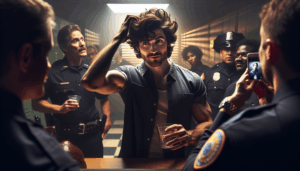Jameson Rodgers Faces Lawsuit: An Unfortunate Incident at a Concert
Jameson Rodgers, a rising star in the country music scene, is currently embroiled in a lawsuit following a troubling incident during his performance at the Barefoot Country Music Festival in New Jersey in 2022. The allegations are serious: Rodgers is accused of hitting a fan in the face with a full can of Miller Lite, an act that has sparked widespread discussion about safety at concerts.
The Incident Details
According to court documents, the incident occurred when Rodgers tossed several unopened cans of beer into the audience. Unfortunately, one of these cans struck a fan, described as hitting her “violently and without warning.” The impact caused severe injuries to her face and head, claiming to result in “permanent” damage.
Legal Proceedings
This lawsuit was initiated last year, but it recently regained public attention when an appeals court ruled that Jameson’s label, Sony Music, must remain a defendant in the case. This decision underscores the complexities of artist liability and the responsibilities that concert producers and record labels bear in ensuring audience safety.
In addition to Sony Music, Miller Brewing Company is also implicated in the lawsuit, highlighting the controversial intersection of product promotion and audience safety at live events. Concert-goers and artists alike should take note of this case as it unfolds, as it serves as a cautionary tale about what can go wrong when items are thrown into the crowd. According to a recent article by The New York Times, throwing objects at concerts can lead to serious injuries, emphasizing the risks involved.
Lawsuit Implications and Artist Impact
This lawsuit raises important questions about the responsibilities of artists during performances. For instance, how can artists engage with fans without compromising safety? The entertainment industry must strike a careful balance between creating a thrilling experience and ensuring fan safety, as highlighted by the discussions on the Billboard website.
It’s essential for both performers and fans to remember that actions taken in the excitement of a live show can have lasting consequences. The notion that one can simply toss beer cans into the crowd overlooks the potential repercussions, making this case a pivotal moment in discussions about concert safety protocols.
Conclusion
As the case progresses, the music industry watches closely, knowing that the outcome could influence future concert safety policies. This situation serves as a powerful reminder that, while concerts should be a place of enjoyment and connection, safety must always come first.
Related Reading







